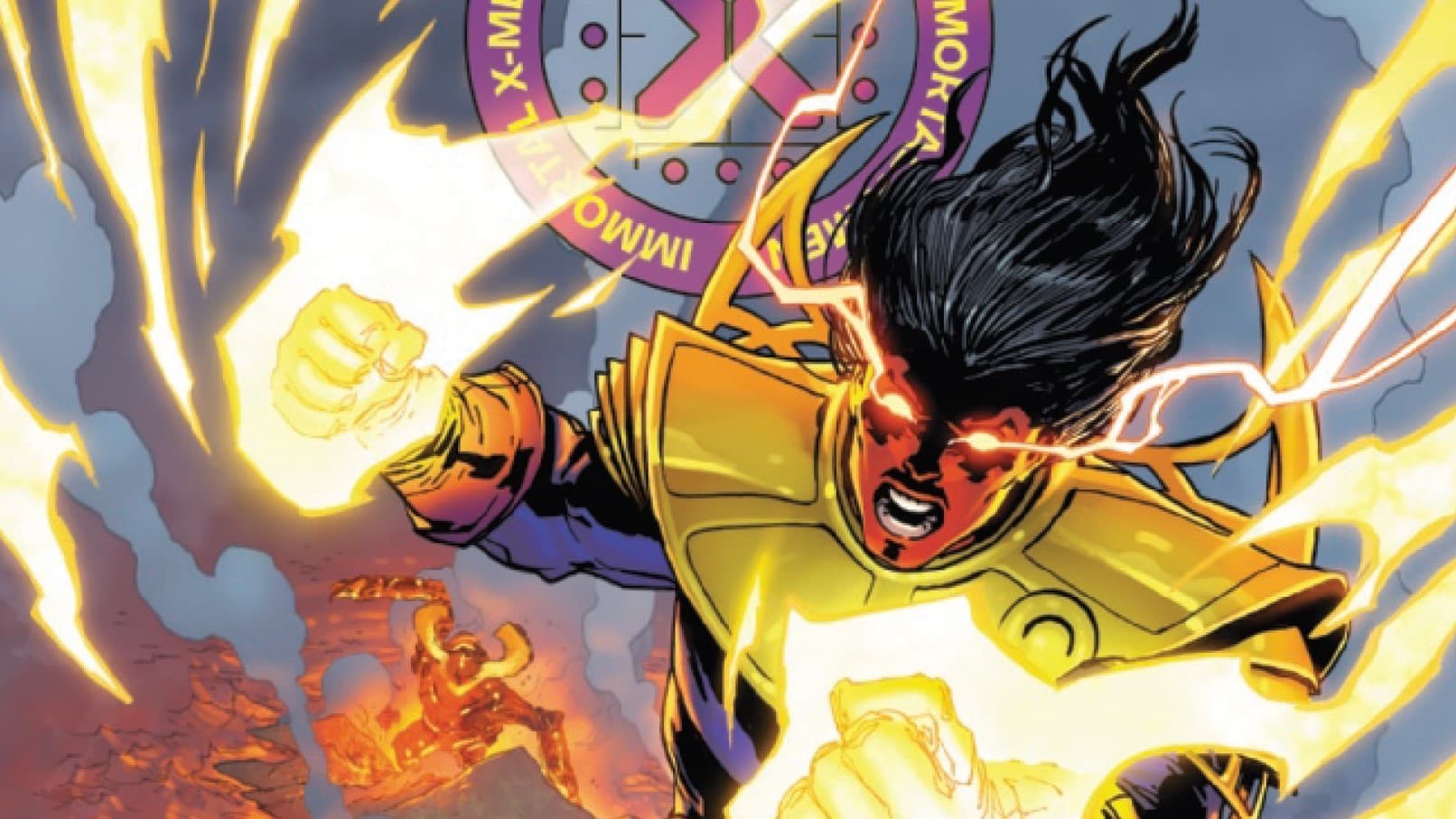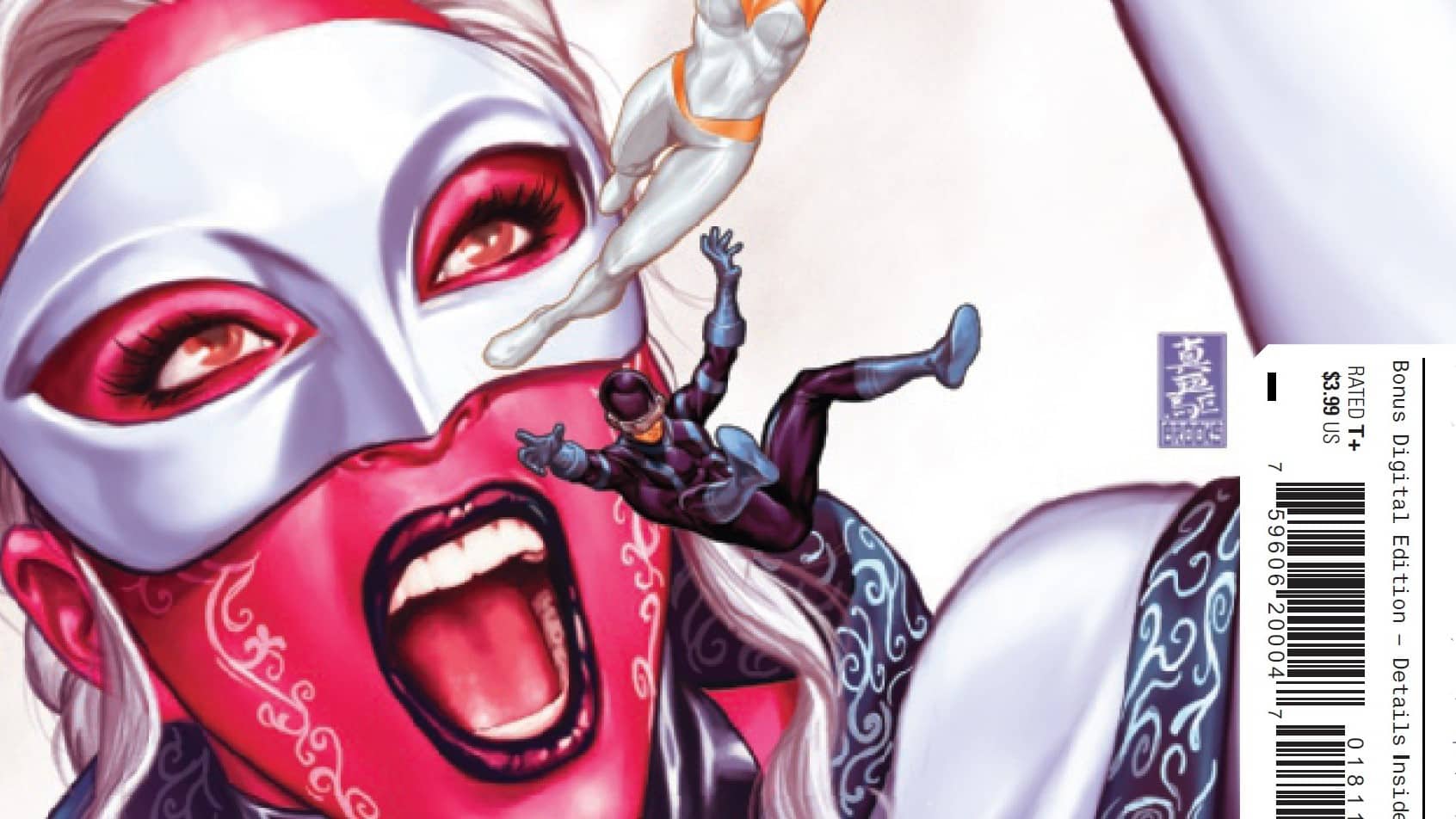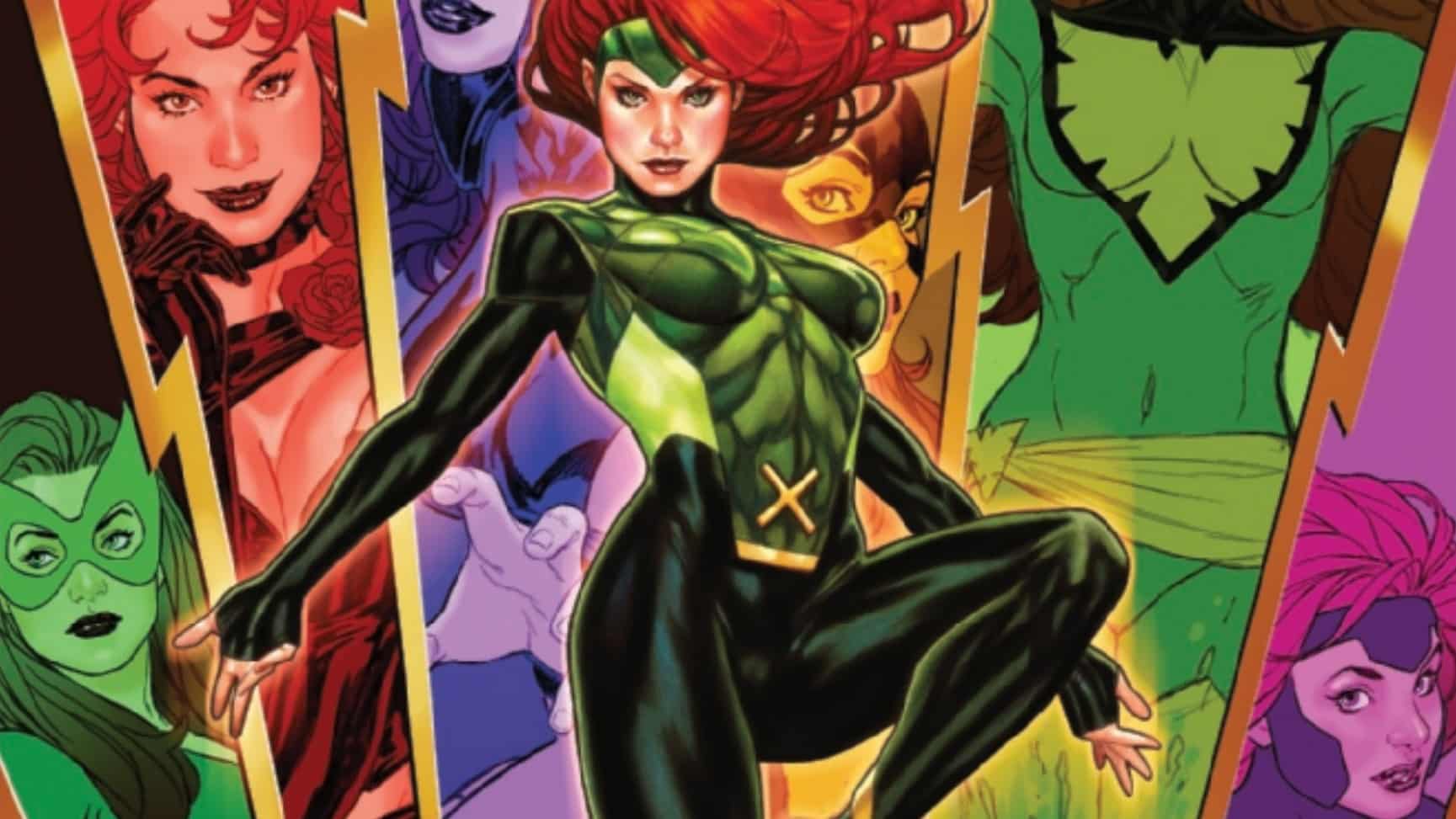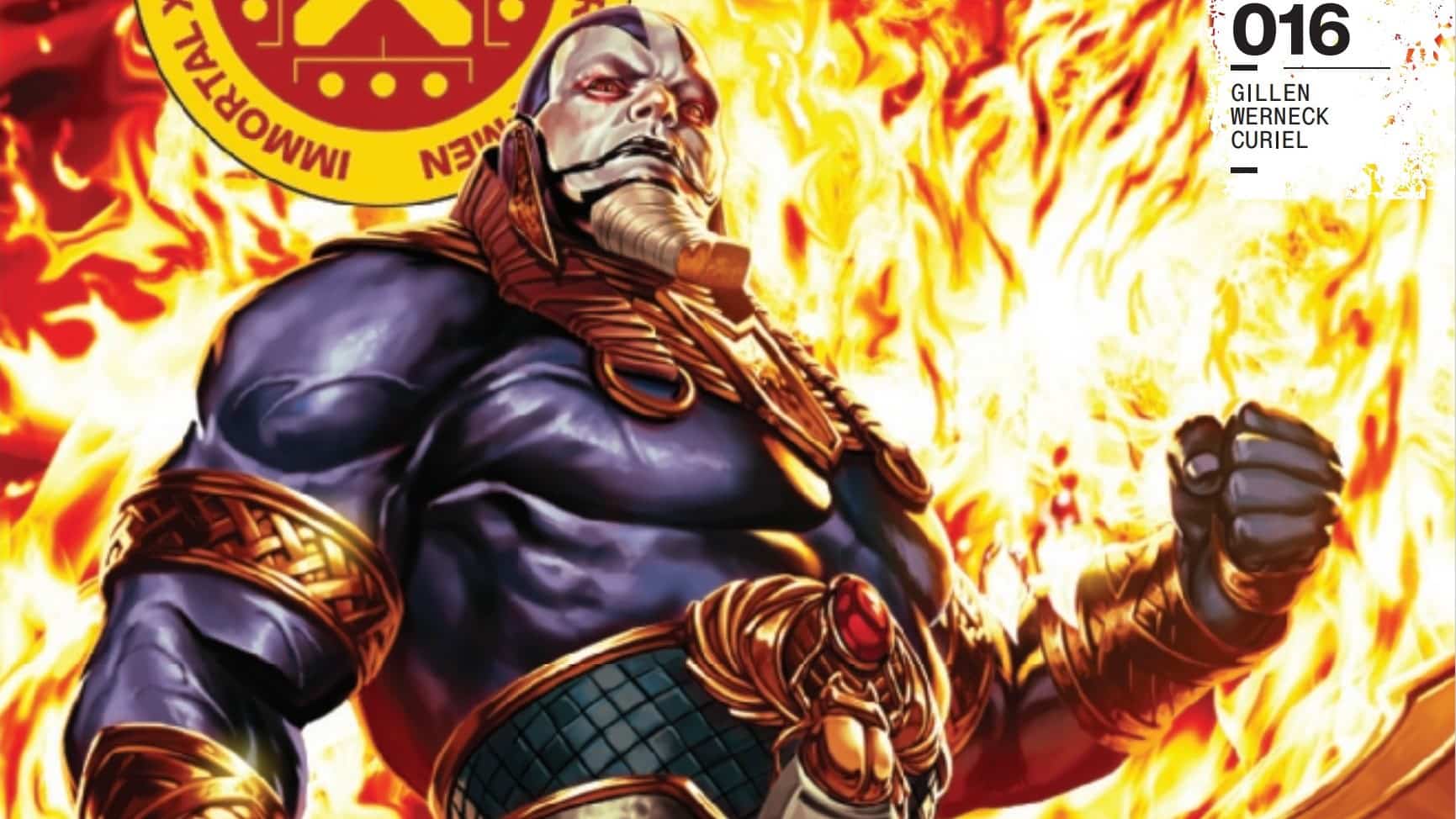Exodus is in the spotlight as “AXE: Judgment Day” tests the faith of mutantkind’s most devout acolyte in Immortal X-Men #5, written by Kieron Gillen, drawn by Michele Bandini, colored by David Curiel, lettered by Clayton Cowles, and designed by Tom Muller and Jay Bowen.
Mark Turetsky: Greetings, Austin! As the counter ticks down toward Judgment Day, we’ve got another tie in(-ish) issue. It’s the Hellfire Gala, and … wait … didn’t this already happen? Wasn’t that another issue? What’s going on?
Austin Gorton: Hi, Mark! While I have a hard time believing this comic steeped in Christian imagery and constant talk of messiahs could possibly have anything interesting to say about resurrections, I guess we may as well get into it anyway.
Mark: Wait … we already reviewed this issue. … We’ve written this discussion. … Could it be? Austin, we’re under psychic attack! It’s becoming clear to me. … It’s a linewide crossover event! It’s infiltrating our minds, locking us in a previous issue discussion. We need to fight back! Focus … what issue did we just read?
Austin: Hold on … Christian imagery … popes and anti-popes … acolytes … this is Immortal X-Men #5, the Exodus spotlight issue! Back, foul Uni-Mind, you can’t defeat our telepathic strike force! You may be coming at us with all the force of a simultaneous crossover issue (See A.X.E.: Judgment Day #1), but we’ve got mutants from the Crusades, mutants from a war-torn future and nerdy mutants with plans to back us up!
An Apology for the Life of Exodus

Mark: Immortal X-Men #5 takes the form of a Confession, in the religious sense. A declaration of religious belief. A creed. You know how we thought last month’s issue, the Emma Hellfire Gala issue, lacked cohesiveness? This one did not suffer from the same issue. The framing story of the psychic attack gives the perfect opportunity to give us a deep dive into Exodus’ history. It all fit for me, except for the opening vignette: the appearance of the Phoenix in the desert. I get the religious imagery, naturally, but without any context, I’m a bit at a loss for what’s going on at that moment. Was this something from an earlier issue?
Austin: Near as I can tell (i.e. a combination of my increasingly shoddy memory and a quick Google search), it was not. The wild thing about the cohesiveness of this issue is that much of it comes from a narrative spine derived from a random one-shot in 1996 written by Ben Raab, a one-shot whose entire existence is seemingly based on a desire to tie off an offhand tease from the X-Men/Avengers crossover “Bloodties” (which was almost certainly teased in the first place with absolutely no plans to pay it off). That issue, which served as Exodus’ origin (and also sort of explained why Exodus seemed familiar to Black Knight in that crossover) serves as a touchstone of sorts to this issue, with Exodus repeatedly returning to it in one way or another. However, there is no encounter with the Phoenix (or the suggestion of one) in that issue; if I had to bet, I’d assume Gillen is setting something up, given the history the X-Men have with the Phoenix Force and the way it’s currently being used in Jason Aaron’s Avengers, aka one third of the characters involved in this crossover.
Mark: He definitely used (the current) Phoenix in a memorable way in Judgment Day #1, and the solicitation text for A.X.E.: X-Men certainly strongly implies that it’s going to be about Jean and her relationship to the Phoenix Force, so that’s probably a good bet.
So how does this issue go about reframing, improving or recontextualizing the Raab one-shot?
Austin: It’s actually remarkably faithful (I say “remarkably” because I’m not sure many people would gnash their teeth in rage if Gillen took a lot of liberties with it, but he largely doesn’t). The Phoenix encounter is the big new addition, and even that is presented like it could be taking place well before the events of the one-shot. After that, it’s all pretty straightforward, even making a point to underscore Sersi’s involvement in the whole affair (She ended up mentally traveling back in time along with Black Knight because of Ultraverse stuff — look it up, kids! [Grote’s note: No. I don’t want to, and you can’t make me]), which is especially relevant to current events, as it gives Exodus relative insight into the Eternals not shared by his Quiet Council peers.
The biggest bit of recontextualization is the way Gillen reframes the events from Exodus’ perspective as a devout Christian with a predilection for devotion and messianism. That was certainly there in the original story (Pre-Apocalypse, Exodus is still a knight of the Crusades, after all), but by putting us in Exodus’ head (whereas most of the original is told from the perspective of Black Knight), Gillen is able to connect the events more to Exodus’ faith. Exodus realizes Apocalypse is a devil meant to tempt him, and he specifically views his status as a mutant (and the fact that he spurned Apocalypse by sparing a human) through the lens of his faith. All of which, of course, resonates more with the present day events without really contradicting anything from the original story.
The New Pope

Mark: What’s really interesting to me about his embracing and discarding Apocalypse and then Magneto is how fickle he comes across. We know he’s got a strong sense of faith (he flies into the sun in one flashback in this issue and doesn’t waver, as wavering would vaporize him), but his allegiances can turn on a dime. He has a little aside about popes and antipopes, how it’s only a matter of which one is accepted. And he makes a point to say that they’ve been superseded, both on the council and in his religion — Apocalypse by Destiny, Magneto by Hope. But for how long are his new idols going to satisfy him? At what point is he going to decide that they’re not what he thought they were, and turn on them and view them as mere prophets at best, Satan at worst? You know what they say: Can’t shake the devil’s hand and say you’re only kidding.
He believes Hope is the Messiah, and back in issue #2 when Hope told him about his powers scaling up with the amount of faith that people have in him, he calls it Revelation: further proof that she’s the Messiah. But then, isn’t that what his evidence for believing Apocalypse was? After all, it’s Apocalypse who “revealed his blessings,” as Exodus calls it.
Austin: That’s the rub, isn’t it? Exodus has perfectly valid reasons for discarding his messiahs — Apocalypse wanted him to kill his friend as an act of faith (and then entombed him for millennia), Magneto kept getting his butt whooped by the X-Men — but at the same time, there’s a sense of Exodus looking for a reason to discard his messiah du jour (It’s also worth noting that Exodus’ cast-aside messiahs are also the two heavy hitters whose departure from the Quiet Council has created the impression that the council is weakened, something that is largely coincidence based on the relative longevity/involvement of the two characters in question, but still interesting).
It’s almost like he enjoys the chase more than the capture; once he finds someone to crown his messiah and declare devotion to, he starts looking for reasons to discredit and discard them. Which begs the question: Will he toss Hope aside? And how long before he decides maybe he’s been the actual messiah all along?
Deus X Gene

Mark: Well, he compares himself to Simon “The Rock” Peter (Thanks, Apocrypals!), the first pope. And while books like Way of X and Legion of X might have teased us with the possibility of a new mutant religion, here we have someone going and doing it themselves. And guess what, it’s a new form of supersessionist Christianity. For those unaware, supersessionism is the belief that Judaism only exists to bring Christianity into the world, and that it’s now served its purpose. It’s … not super great. Here, though, Exodus is taking the trappings of Christianity and putting a mutant spin on it. It’s Christianity that’s being superseded. The Cross? Well, that’s just a symbol for the true divinity, and that’s the X gene, the “cross” that all Mutants bear.
He’s kinda lost it.
Austin: He’s also referring to Jesus as a mutant again, which is still something I’m 100% sure Exodus has decided is true entirely on his own. And he’s more than capable of mixing metaphors, as he declares that in addition to Peter, he’s another rock, the rock in the hand of Cain (an admittedly badass sentiment), as he flies toward the gigantic Hex, while also equating himself with a knight going to slay a dragon (in two separate instances). Much like he sometimes seems like someone who enjoys searching for a messiah more than serving one, it also sometimes seems like he’s into the iconography and mythology of Christianity more than its actual teachings, which is an intriguing (if all too common) contradiction.
Mark: I found it curious that he refers to himself as the rock that slew Abel and not, say, the rock that slew Goliath. He’s just a little guyy! And he’s going up against a literal giant! The one is the first murder, sibling rivalry over the quality of burnt offerings. The other is the archetypal heroic underdog moment. And yet he reaches for the murder. And, as far as not being big on the teachings of Christ, he was a Crusader. Still is, as far as he’s concerned.
And while the PR surrounding it is coy about it, this entire event is so deeply founded on a conflict of religions, and reminiscent of a Crusade. You have Druig and Uranos following their (space-)god-given diktat to “correct excess deviation”; you’ve got Exodus, the mutants and the quasi-religious aura around Krakoa and The Five; and in the middle, well, there’s the secular humanist … humans, in the form of the Avengers. But maybe that’s moving a bit too far beyond the bounds of a discussion of this comic, where Uranos, Druig and the Avengers do not appear.
Austin: It’s important to remember: Exodus may be the protagonist of this issue (and Krakoa has in general blurred a lot of traditional distinctions), but he’s still a super-villain. And that shows in the metaphor he adopts.
X-Traneous Thoughts
- Telling that Shaw’s only knowledge of the Eternals is that he’s heard about Sersi.
- A good chunk of this issue’s non-Exodus narrative is showing events from A.X.E.: Judgment Day #1 from the perspective of the X-Men/the Quiet Council (with some repeated bits of dialogue), as Gillen draws the crossover threads tighter (You’d have no idea where the Hex came from if you hadn’t read that issue, for example).
- Bandini does some really cool work with offsetting panels in showing the dilation of time during the psychic attack, making them just quite, but not quite, overlap.
- From the point of view of A.X.E.: Judgment Day #1, the reason the Uni-Mind called off its attack is because it was only a distraction for the council while Jack of Knives killed Hope. When Logan saved Hope and Jack failed, the distraction was no longer needed.
- Emma is certain Cyclops will have a defense plan for dealing with the Eternals. “Bless that nerd,” agrees Kate.
- The scenes of Magneto releasing Exodus from his tomb and pressing him into his service are another thing that’s only been alluded to but never depicted before.
- The title, “Meditations on the X,” is a play on Dietrich Bonhoeffer’s Meditations on the Cross. Bonhoeffer was a Lutheran theologian who was murdered by the Nazis in the Holocaust.
- The war between the X-Men and the Eternals even spills out onto the data page, with the X-Men’s “psychic engagement plan” butting heads with the Eternals’ Uni-Mind internal log.






